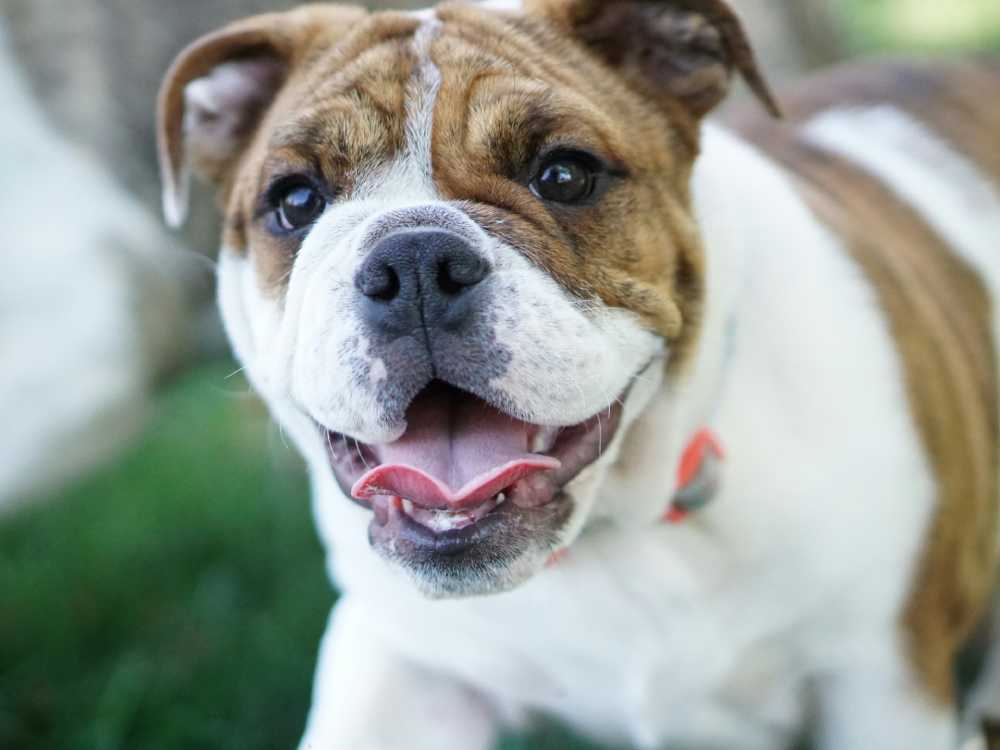Bulldogs Life Expectancy
Bulldogs have a life expectancy of 8 to 10 years, substantially shorter than many other dog breeds. My experience as a veterinarian treating hundreds of bulldogs has always motivated me to help owners extend their pet’s lives.
Proper care and attention can help bulldogs live longer, healthier lives. Your bulldog’s life expectancy depends on genetics, but you can take specific steps to maximize their lifespan. Every aspect of care contributes to a bulldog’s longevity, from managing respiratory health to maintaining proper weight.
This complete guide shows proven strategies to help bulldogs live their fullest lives. You’ll find essential care techniques, health management tips, and preventive measures that can improve your bulldog’s quality of life and longevity.
Contents
- 1 Understanding Bulldog Health Fundamentals
- 2 Optimizing Respiratory Health
- 3 Maintaining Healthy Skin and Coat
- 4 Supporting Joint and Mobility Health
- 5 Preventive Healthcare Essentials
- 6 Bulldogs Life Expectancy Frequently Asked Questions
- 6.1 What is the most common cause of death in bulldogs?
- 6.2 Can a Bulldog live 20 years?
- 6.3 What age is considered old for a Bulldog?
- 6.4 At what age do English Bulldogs slow down?
- 6.5 How do I know if my English bulldog is dying?
- 6.6 Why do bulldogs have a short lifespan?
- 6.7 How to help your Bulldog live longer?
- 6.8 How old is 7 in Bulldog years?
- 6.9 How often should a Bulldog be bathed?
- 6.10 Are Bulldogs smart?
- 6.11 How old is a 2-year-old Bulldog in human years?
- 6.12 What are the signs of an aging English Bulldog?
- 6.13 Are English Bulldogs clingy?
- 6.14 Why does my Bulldog walk so slow?
- 6.15 How long do healthy Bulldogs live?
- 6.16 How can you tell a Bulldogs age?
- 6.17 How can I make my English Bulldogs life expectancy longer?
- 6.18 How old is a 13-year-old Bulldog in human years?
- 6.19 Which dog can live 100 years?
Understanding Bulldog Health Fundamentals
DNA is vital in determining a bulldog’s health and how long they live. DNA studies show that selective breeding has changed the breed’s genome drastically over five centuries. Breeders focused on looks instead of health.
Genetic factors affecting lifespan
Bulldogs today have genetic profiles that raise health concerns. Research shows that 20% of bulldogs die from cardiac-related issues. 18% succumb to cancer, and only 9% reach old age. The breed’s gene pool has many similar regions in the genome. This similarity limits breeders’ ability to improve health through breeding alone.
Common health challenges in Bulldogs
Bulldogs have specific health issues that affect how long they live:
- Brachycephalic Airway Syndrome (BOAS): Their flat face causes breathing problems and makes exercise difficult
- Joint Issues: 72% of English bulldogs could develop hip dysplasia
- Skin Problems: Deep facial folds make them prone to infections
- Heart Conditions: Heart issues affect 11.8% of bulldogs and remain the top cause of death
Setting realistic life expectancy goals
Owners can provide better care by knowing realistic life spans. Here’s how different bulldog breeds compare:
- English Bulldog 8-10 years
- French Bulldog 10-12 years
- American Bulldog 10-15 years
The median lifespan for English bulldogs is 8.4 years, though some live longer with good care. Studies show that flat-faced dog breeds have a 40% higher risk of early death compared to dogs with normal face shapes. These numbers help set realistic expectations and guide proper health care strategies.

Optimizing Respiratory Health
Breathing problems can make or break a bulldog’s quality of life. Their respiratory health is the life-blood of their overall wellbeing. My years of treating countless bulldogs have taught me that proper breathing management can add valuable years to their lives.
Managing brachycephalic airway syndrome
Many bulldogs suffer from Brachycephalic Airway Syndrome (BOAS) because of their unique facial structure. You’ll notice these common signs:
- Loud breathing and snoring
- Exercise intolerance
- Gagging while swallowing
- Cyanosis (blue-tinged gums)
- Occasional collapse, especially during activity
BOAS usually starts during puppyhood and gets worse with time, so early intervention makes a huge difference. Weight management becomes vital since extra pounds put more strain on already struggling airways.
Exercise and breathing techniques
Bulldogs with breathing issues need proper exercise management. They respond well to a well-laid-out physical activity plan that builds respiratory strength without pushing too hard. Short, easy walks work better than intense workouts.
Activity Type Duration Frequency Morning Walk 10-15 min Daily Play Session 5-10 min 2-3x daily Rest Periods As needed Throughout Environmental considerations for breathing
Your bulldog’s breathing capacity depends substantially on their environment. These dogs struggle with hot or humid weather, so temperature control matters. A well-ventilated home with steady temperatures helps prevent breathing problems.
Bulldogs breathe easier with a harness than a collar because it reduces windpipe pressure. A calm environment helps too, since stress can make breathing difficulties worse. Some cases might need surgery to fix anatomical issues that block airflow.
Watch for early warning signs to prevent breathing emergencies. Quick action with cooling and rest in a quiet space can help stabilize your bulldog’s breathing. More serious cases might need surgery to fix their soft palate or nostrils for better airflow.
Maintaining Healthy Skin and Coat
A bulldog’s quality of life and health span greatly depends on proper skin and coat care. Your bulldog needs daily attention, good nutrition, and preventive care to keep their skin healthy. I’ve learned this through years of specialized bulldog veterinary practice.
Daily cleaning and grooming routines
Your bulldog needs regular grooming to stay healthy and avoid common skin problems. You should brush your pet 3-4 times weekly to keep their coat healthy and spread natural oils evenly.
Grooming Task Frequency Purpose Brush Coat 3-4x weekly Remove dead hair, distribute oils Clean Wrinkles Daily Prevent moisture buildup Full Bath Every 4-6 weeks Deep clean without over-drying Preventing skin fold infections
Skin fold dermatitis can be risky for bulldogs, especially in facial wrinkles and tail pockets. Bacteria and yeast love these warm, moist areas. You can prevent infections by:
- Clean wrinkles daily with a soft, damp cloth
- Dry thoroughly after cleaning
- Use veterinary-approved antimicrobial wipes for deep folds
- Monitor for signs of redness, odor, or irritation
Dietary support for skin health
The right diet plays a vital role in your bulldog’s skin and coat health. Wild-caught fish like salmon and trout provide omega-3 and omega-6 fatty acids that reduce inflammation and support healthy skin. Your bulldog will also benefit from:
- Lean chicken for essential proteins
- Eggs for biotin and healthy fats
- Sweet potatoes and carrots for vitamins and antioxidants
- Plain yogurt for probiotics that support skin health
Senior bulldogs need more protein and less fat to maintain muscle mass without gaining extra weight. Adding omega fatty acid supplements helps their joints and skin stay healthy as they age.
Watch for early warning signs of skin problems. Take your bulldog to the vet quickly if you notice excessive scratching, redness, or unusual odors. Quick action prevents small issues from becoming serious health problems. Good skin care helps your bulldog stay healthy throughout their life.
Supporting Joint and Mobility Health
Joint health management plays a vital role in extending a bulldog’s life expectancy. Research shows that proper mobility care can affect their quality of life by a lot. Dogs that exercise more than 60 minutes daily have lower lameness scores compared to those exercising less than 20 minutes.
Weight management strategies
Your bulldog’s joint health depends on maintaining a healthy weight. Research shows excess weight adds pressure on joints, especially when you have breeds prone to hip dysplasia and arthritis. Here’s how to maintain optimal weight:
- Monitor monthly weigh-ins
- Use measured portions for meals
- Keep treats under 10% of daily calories
- Add healthy vegetables to feel full without extra calories
Joint-friendly exercise routines
Bulldogs need regular, low-impact, and controlled exercise programs. Recent studies show dogs with hip arthritis that exercise daily have better mobility than those with sedentary lifestyles. A balanced exercise routine should include:
Activity Type Duration Benefits Leash Walks 30-60 min daily Muscle strength Swimming 15-20 min sessions Low-impact cardio Gentle Play 10-15 min intervals Mental stimulation Supplements for joint health
Joint supplements help support mobility as bulldogs age. Studies reveal that all but one of these dogs over one year old experience joint problems. These supplement combinations work well:
Primary Supplements:
- Glucosamine and Chondroitin: Support cartilage health
- Omega-3 Fatty Acids: Help reduce joint inflammation
- Green-Lipped Mussel: Contains natural anti-inflammatory compounds
These supplements work best when combined with proper exercise modifications. Your dog should avoid high-impact activities like running and jumping that can strain joints. Focus instead on controlled movements that build strength safely.
Regular vet checkups ensure your joint health management strategies work effectively. Early treatment of joint issues can affect a bulldog’s mobility and life expectancy. Proper joint care combined with weight management and exercise helps bulldogs stay active through their senior years.
Preventive Healthcare Essentials
Preventive healthcare helps bulldogs live longer. Research shows that good preventive care can boost their quality of life and substantially affect how long they live.

Regular veterinary check-up schedule
Your bulldog needs different levels of vet care as they age. Adult bulldogs between 1-7 years need yearly wellness exams. Senior bulldogs over 8 years should see the vet twice a year.
A detailed vaccination plan protects bulldogs from diseases they can avoid. Your bulldog needs these core vaccines:
- Parvovirus
- Canine distemper
- Rabies
- Adenovirus-2
Your bulldog needs year-round protection from parasites. Research shows that dogs without routine care often get internal and external parasites, even with available treatments. A complete parasite prevention plan should have:
- Monthly heartworm preventatives starting at 8 weeks old
- Regular fecal tests to check if prevention works
- Year-round flea and tick control products
Recent studies show tick-borne diseases have jumped 41-167%. This makes consistent prevention vital for your bulldog’s health.
Early warning signs to watch for
Quick detection of health issues makes treatments work better. Watch your bulldog for:
Immediate Attention Required:
- Breathing difficulties
- Collapse or seizures
- Sudden changes in bowel movements
- Excessive whining or panting
Schedule Prompt Vet Visit:
- Reduced appetite or thirst
- Changes in energy levels
- Skin irritations or infections
- Joint stiffness or limping
Pet insurance can help cover surprise costs for bulldog puppies. Quick action often leads to better results. Dogs that get regular preventive care show better health markers and live longer than those who only see the vet when sick.
Your bulldog should have a steady relationship with a vet who knows breed-specific challenges. This partnership makes shared health monitoring easier and speeds up responses to new problems. Recent data shows that older bulldogs benefit from preventive screening tests that can save their lives by catching age-related conditions early.
Bulldogs Life Expectancy Frequently Asked Questions
What is the most common cause of death in bulldogs?
The most common cause of death in bulldogs is cardiac disease, followed closely by cancer and respiratory issues. Due to their brachycephalic nature, they often suffer from breathing difficulties, which can lead to complications as they age. Proper veterinary care and maintaining a healthy weight can help reduce the risk of these conditions.
Can a Bulldog live 20 years?
It is highly unlikely for a bulldog to live 20 years, as their average bulldog lifespan is much shorter. Most bulldogs live between 8 to 12 years, though some may reach their mid-teens with excellent care. Their genetic predisposition to health problems often prevents them from reaching extreme old age.
What age is considered old for a Bulldog?
A bulldog is considered old around the age of 7 to 8 years. This is when they begin showing signs of aging, such as slower movement, joint pain, and decreased energy levels. Since the average bulldog life expectancy is relatively short, senior care should begin early.
At what age do English Bulldogs slow down?
English Bulldogs typically begin to slow down around the age of 5 or 6. At this stage, they may become less active and require more rest. Maintaining a proper diet and engaging them in light exercise can help prevent excessive weight gain and joint issues.
How do I know if my English bulldog is dying?
Signs that an English Bulldog is nearing the end of its life include extreme fatigue, difficulty breathing, loss of appetite, and incontinence. They may also withdraw from social interaction and exhibit signs of pain. Providing comfort and seeking veterinary guidance can help during this difficult time.
Why do bulldogs have a short lifespan?
Bulldogs have a short lifespan due to their genetic predisposition to various health conditions, including respiratory issues, heart disease, and joint problems. Their unique body structure, including a flat face and compact body, contributes to many of these health concerns. Proper care and responsible breeding practices can help improve bulldogs life expectancy.
How to help your Bulldog live longer?
To help your bulldog live longer, provide a well-balanced diet, regular veterinary checkups, and moderate exercise. Avoiding obesity is crucial since excess weight can put extra strain on their joints and heart. Ensuring they live in a cool, well-ventilated environment can also prevent overheating, a common issue in the breed.
How old is 7 in Bulldog years?
A 7-year-old bulldog is roughly equivalent to a 50-year-old human. Since bulldogs age more rapidly than some other breeds, senior care should begin around this time. Keeping up with their health needs can significantly impact their quality of life.
How often should a Bulldog be bathed?
A bulldog should be bathed about once every 4 to 6 weeks. Frequent bathing can strip their skin of essential oils, leading to dryness and irritation. However, cleaning their wrinkles and paws regularly is important to prevent infections.
Are Bulldogs smart?
Bulldogs are intelligent but can be stubborn, which sometimes makes them seem less trainable. They respond best to positive reinforcement and consistent training methods. While they may not rank highly in obedience, they are very perceptive and form strong bonds with their owners.
How old is a 2-year-old Bulldog in human years?
A 2-year-old bulldog is roughly equivalent to a 24-year-old human. This is when they reach full maturity and settle into their adult temperament. Providing proper training and nutrition during their early years is essential for long-term health.
What are the signs of an aging English Bulldog?
Signs of an aging English Bulldog include slower movement, gray fur around the muzzle, increased sleep, and joint stiffness. They may also develop vision or hearing loss and require more frequent veterinary care. Adjusting their diet and exercise routine can help support their aging body.
Are English Bulldogs clingy?
Yes, English Bulldogs are known to be very clingy and affectionate toward their owners. They thrive on companionship and do not like being left alone for long periods. Their attachment makes them great family pets but can also lead to separation anxiety.
Why does my Bulldog walk so slow?
Your Bulldog may walk slowly due to joint pain, obesity, or simply because of their naturally relaxed temperament. If the slow walking is accompanied by limping or difficulty getting up, a vet check is recommended. Regular low-impact exercise can help maintain their mobility.
How long do healthy Bulldogs live?
Healthy bulldogs can live between 10 to 12 years, though some may reach 13 or 14 with excellent care. Their environment, diet, and genetics play a crucial role in determining their lifespan. Understanding how long do bulldogs live can help owners take proactive steps for their pet’s well-being.
How can you tell a Bulldogs age?
You can estimate a bulldog’s age by examining their teeth, coat condition, and overall energy level. Younger bulldogs have whiter teeth, while older ones show wear and tartar buildup. A vet can provide a more accurate estimate through a physical examination.
How can I make my English Bulldogs life expectancy longer?
To extend your English Bulldog’s life, focus on a healthy diet, regular checkups, and moderate exercise. Preventing obesity and keeping them cool in hot weather are also essential. By taking these steps, you can improve their overall english bulldog life expectancy.
How old is a 13-year-old Bulldog in human years?
A 13-year-old Bulldog is approximately 82 to 85 in human years. At this age, they are considered extremely old and may require significant medical attention. Keeping them comfortable and providing joint support can help improve their quality of life.
Which dog can live 100 years?
No dog can live 100 years, as even the longest-living breeds, such as the Chihuahua or Australian Cattle Dog, typically only reach 20 years. The longest-lived dog on record was 31 years old. While some breeds have longer lifespans, all dogs eventually succumb to aging.

